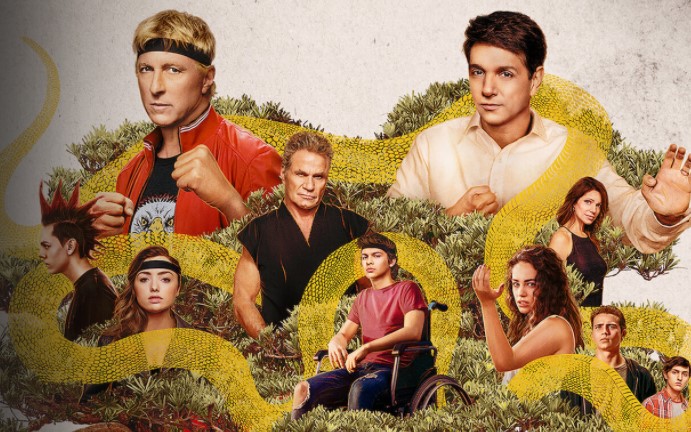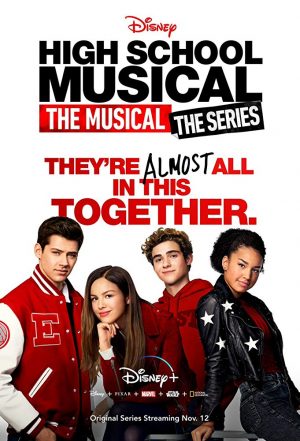REVIEW: ‘Cobra Kai’ is a knockout
Photo Obtained from Netflix. “Cobra Kai” has exceeded all expectations as a “Karate Kid” reboot that features the original cast with some new additions.
January 27, 2021
Everyone knows remakes are never as good as the originals, but Netflix’s “Cobra Kai” comes as close as it gets. Based 30 years after “The Karate Kid,” Cobra Kai brings a whole new perspective to the epic rivalry between Johnny Lawrence and Daniel LaRusso by turning former high school bully Lawrence into the show’s main protagonist.
Despite the shift in perspective, the show remains true to its roots, sprinkling in flashbacks to the original movie to explain how childhood trauma shaped each character in their adult life. Unlike LaRusso, who has made a comfortable living for himself as a car dealership owner, in which he uses his victory in the All Valley Tournament as a selling point, (“We kick the competition!”) Lawrence seems to have stumbled into a depressing mid-life crisis. Divorced, hated by his child Robby, living off of Coors Banquet beers and driving the same iconic Pontiac Firebird as he did in high school, life does not seem to have gone his way since LaRusso came to town in ‘84. However, redemption from this unfulfilling life presents itself in the form of Miguel, Lawrence’s scrawny teenage next door neighbor. In addition to their age, the pair are complete opposites of each other, and yet Lawrence’s blunt, no bullshit personality clashes with Miguel’s sweet, politically correct nature in the best ways possible. When Miguel begs Lawrence to teach him Karate to fight off his bullies, Lawrence seizes the opportunity for a fresh start by reopening his childhood dojo “Cobra Kai.” Despite the traumatic memories he associates with karate due to the toxic environment his childhood sensei created (who resurfaces at the end of season one), Lawrence faces his past in hopes of creating a better future.
“Cobra Kai” delivers a breath of fresh air to the original franchise by unfolding the rivalry onto a new generation. When LaRusso sees the dojo that plagued his entire high school career has re-opened, he retaliates by opening Miyagi-Do, a dojo built on the ideals of his passed sensei Mr. Miyagui. While Cobra Kai is practically crawling with students feigning for the chance to conform to the badass ‘no mercy’ culture the dojo demands, Miyagi-Do hosts a mere two pupils, one being LaRusso’s daughter Sam, and the other being Robby- Lawrence’s estranged son. An intense ‘us vs them’ mentality brews between the students in the two dojos, and a continuous love triangle between Sam, Miguel and Robby certainly does not ease the tensions. That being said, Cobra Kai’s iconic motto, “Strike first, strike hard, no mercy,” reigns true throughout the three seasons, as nail-biting fight scenes are a guarantee in every episode.
Perhaps the best part of the series, however, is not the drama, love triangles or even the karate, but the rich character development that suggest that the perceived ‘villains’ were never even villains at all, they were just misunderstood. Rather than painting one person as the antagonist for the watcher to root against, the show highlights the ‘bad sides’ of every character-even the beloved Daniel LaRusso- in order to create a realistic sense of humility that proves no one is always ‘good.’ As the seasons progressed, I found myself switching sides between LaRusso and Lawrence, for “Cobra Kai” focuses on exploring why the characters are the way they are rather than just presenting them to the audience at face value. For instance, in “The Karate Kid,” Lawrence is characterized as a relentless bully. “Cobra Kai,” however, exposes how he was forced to showcase a rough exterior in order to endure the bullying from pretty much every male figure in his life. Internal demons of each character are put on display to reinforce the notion that people are a product of their environment, no one is inherently ‘evil.’
The show has earned its blackbelt in the world of movie reboots by achieving the perfect confluence of cheesiness and drama (with a hint of childhood nostalgia). The idea of two karate dojos battling in 21st century Los Angeles is as ridiculous as plot lines go, but that is exactly why it works. “Cobra Kai” provides its audience with a refuge to their childhood comfort movie while still instilling a reality check that true villains only exist in the cinematic universe. Already renewed for a fourth season, nothing seems to be kicking “Cobra Kai” off the charts anytime soon.





